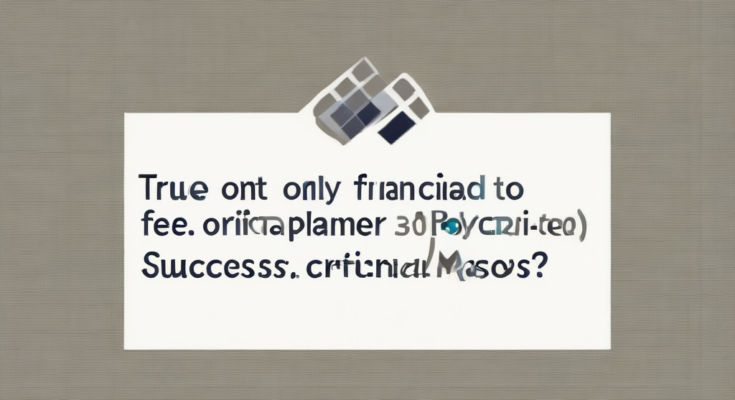Unlocking Financial Freedom: The Power of a Fee-Only Certified Financial Planner
Navigating the complex world of personal finance can feel overwhelming. Investment strategies, retirement planning, tax optimization, estate planning – the sheer number of considerations can leave even the most financially savvy individuals feeling lost. This is where a fee-only certified financial planner (CFP) can prove invaluable. Unlike advisors who earn commissions from product sales, fee-only CFPs operate on a transparent, fee-based model, putting your best interests squarely at the forefront.
What is a Fee-Only Certified Financial Planner?
A fee-only CFP is a financial advisor who charges clients a predetermined fee for their services, completely separate from any investment products they might recommend. This fee structure eliminates potential conflicts of interest inherent in commission-based models, ensuring unbiased advice tailored to your specific needs and financial goals.
The “Certified Financial Planner” designation signifies that the advisor has met rigorous educational, examination, experience, and ethical requirements set by the Certified Financial Planner Board of Standards, Inc. This certification provides a level of assurance regarding the advisor’s competence and commitment to ethical conduct.
The Advantages of Working with a Fee-Only CFP
- Objectivity and Transparency: Fee-only CFPs have no incentive to steer you towards specific products simply to earn a commission. Their recommendations are based solely on your financial situation and goals, ensuring truly objective advice.
- Fiduciary Duty: Many fee-only CFPs operate under a fiduciary duty, legally obligated to act in your best interests. This provides an additional layer of protection and ensures that your financial well-being is their paramount concern.
- Personalized Financial Plans: Fee-only CFPs take the time to understand your unique circumstances, aspirations, and risk tolerance. They then develop a comprehensive financial plan tailored to your individual needs, offering a roadmap to achieving your financial goals.
- Long-Term Perspective: Unlike commission-based advisors who might focus on short-term sales targets, fee-only CFPs take a long-term perspective, guiding you towards sustainable financial health over the years.
- Cost Clarity: The fee structure is transparent and upfront. You know exactly how much you’ll pay for their services, avoiding hidden costs or unexpected commissions.
- Holistic Approach: Fee-only CFPs often address all aspects of your financial life, including retirement planning, investment management, tax planning, estate planning, and insurance. This holistic approach ensures a coordinated and comprehensive strategy.
- Empowerment and Education: Fee-only CFPs aim to empower their clients by educating them about financial concepts and strategies. This enables clients to actively participate in the planning process and make informed decisions.
Finding the Right Fee-Only CFP
Choosing a fee-only CFP requires careful consideration. Here are some key steps to follow:
- Check Credentials: Verify that the advisor holds the CFP certification and is registered with the appropriate regulatory bodies.
- Seek Referrals: Ask friends, family, or colleagues for recommendations. Online reviews can also be helpful, but should be considered alongside other factors.
- Schedule Consultations: Meet with several fee-only CFPs to discuss your needs and assess their expertise and communication style. A good rapport is essential for a successful working relationship.
- Review Fees: Clearly understand their fee structure, whether it’s hourly, project-based, or percentage-based. Compare fees across different advisors to ensure you’re getting a fair price.
- Assess Their Experience and Specialization: Consider their experience in areas relevant to your financial goals. Some CFPs specialize in specific niches like retirement planning or estate planning.
- Confirm Fiduciary Duty: If a fiduciary duty is important to you, confirm that the advisor operates under one.
- Check for Potential Conflicts of Interest: While fee-only advisors minimize conflicts, ensure that there are no secondary business relationships that could influence their recommendations.
Fee Structures for Fee-Only CFPs
Fee-only CFPs typically employ various fee structures, including:
- Hourly Fees: The advisor charges an hourly rate for their services. This is common for smaller projects or specific tasks.
- Project Fees: A flat fee is charged for completing a specific project, such as developing a comprehensive financial plan or assisting with a tax strategy.
- Percentage-Based Fees (AUM): A percentage of the assets under management (AUM) is charged as an annual fee. This is common for ongoing investment management services.
- Retainer Fees: A regular fee is paid to the advisor for ongoing advice and support, regardless of the amount of work performed.
It’s crucial to clarify the fee structure upfront and understand what services are included in the fee. Be wary of any hidden fees or unexpected charges.
Fee-Only CFPs vs. Commission-Based Advisors
The fundamental difference lies in how they are compensated. Fee-only CFPs are compensated solely by their clients, while commission-based advisors earn a commission on the financial products they sell. This difference significantly impacts the advice they provide:
- Incentives: Commission-based advisors are incentivized to sell products, regardless of whether those products are the best fit for the client’s needs. Fee-only CFPs, on the other hand, are incentivized to provide the best possible financial advice.
- Transparency: Fee-only CFPs have transparent fee structures. Commission-based advisors’ compensation can be opaque and difficult to understand.
- Objectivity: Fee-only CFPs provide unbiased advice based solely on the client’s best interests. Commission-based advisors may have a conflict of interest, leading to potentially biased recommendations.
- Client Relationship: Fee-only CFPs often foster a stronger client-advisor relationship built on trust and long-term collaboration. The relationship with a commission-based advisor may be more transactional.
The Value of a Fee-Only CFP
While the upfront cost of hiring a fee-only CFP might seem higher than using a commission-based advisor (who may initially appear “free”), the long-term value is often significantly greater. The unbiased advice, comprehensive planning, and potential for greater financial returns far outweigh the cost of their fees. A fee-only CFP can help you avoid costly mistakes, optimize your financial resources, and achieve your long-term financial goals.
Ultimately, choosing a fee-only CFP is an investment in your financial future. It’s an investment in peace of mind, knowing that your financial well-being is in the hands of a professional who is committed to acting in your best interests, free from the influence of commission-driven sales targets.
By carefully selecting a qualified and trustworthy fee-only CFP, you can navigate the complexities of financial planning with confidence, ultimately unlocking the path to greater financial freedom and security.

